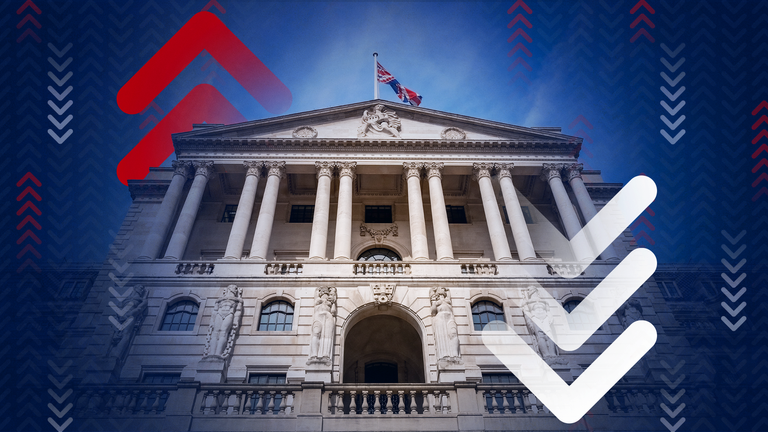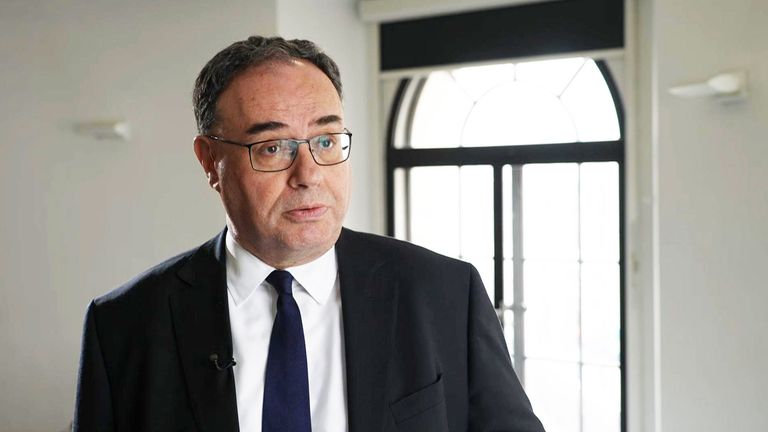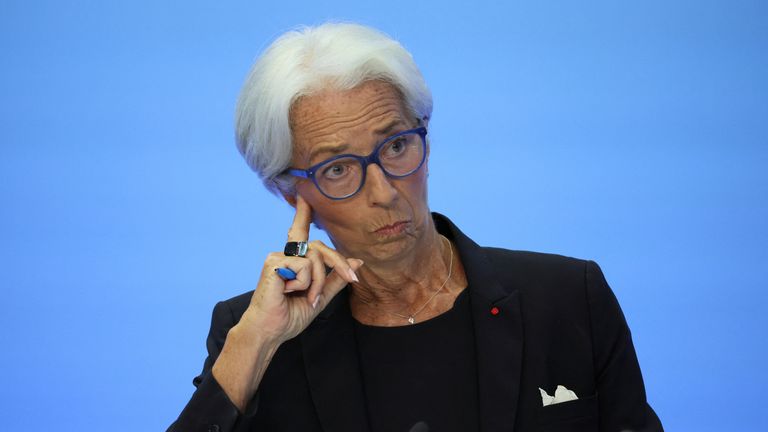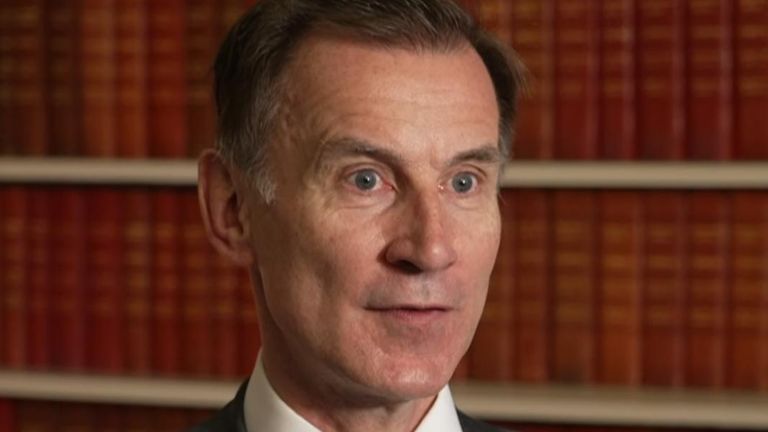Have interest rate cuts been delayed and how long will the wait be?
Expectations about when central banks will lower rates have been scaled back this week.
Thursday 11 April 2024 20:32, UK
Financial markets are scaling back expectations about interest rate cuts in countries such as the UK this year.
Many Western nations have imposed rate hikes in recent years as part of attempts to bring down soaring inflation - which has now started to ease.
However, new figures in the US on Wednesday showed that inflation was stronger than expected in March - and the pace of price rises remains "sticky" in other nations too.
Investors believe the Federal Reserve will now take longer to cut interest rates as a result of the latest data - and that other central banks could act similarly, given the importance of the US to the global economy.
Why does it matter to ordinary people?
Higher interest rates mean higher costs of borrowing - including for mortgages and loans.
So reducing rates should give the economy a boost, including by making it slightly easier for those who want to get on the housing ladder or by making loans more attractive for businesses wanting to make investments.
On the flip side, higher interest rates help people with savings, in theory. However, there are concerns banks have not been fully passing on the benefits.
Why are interest rates high?
Like other central banks, the Bank of England has been increasing the cost of borrowing in recent years because it wants to bring inflation down to its target of 2%.
Inflation has been easing, but is still at 3.4%, according to latest official figures.
The Bank's Monetary Policy Committee (MPC), which makes decisions on interest rates, most recently held them at 5.25% for the fifth time in a row in March.
When are rates coming down in the UK?
The Bank of England's next decision is due on 9 May. Earlier this year, investors had anticipated the first interest rate cut of the year would be then, but most are now not expecting any change.
Governor Andrew Bailey, like most central bank bosses, has refused to be drawn on when exactly cuts could be made, and says the MPC's decision will be driven by the latest data.
He told Sky News last month: "We're not yet at the point where we can cut interest rates, but things are moving in the right direction."
However, Megan Greene, who is one of the nine members of the MPC, said on Thursday she believed the UK "should still be a way off" interest rate cuts, like the US.
She told the Financial Times that while there had been "encouraging news" over wage growth and service inflation figures in the UK, the risks of inflation persistence "remains higher than in other advanced economies".
Her comments echoed similar recent remarks by her hawkish MPC colleague Jonathan Haskel to the same newspaper.
A lot depends on upcoming official economic data - such as the next inflation figures for the UK, which are due to be published on Wednesday 17 April.
However, financial markets are growing pessimistic.
Investors have pushed back their expectations and now believe it is most likely that the Bank will wait until August before making a 0.25 percentage point cut.
What other central banks do could also have an impact on the MPC's decision.
What about in the US and EU?
In the US, several global brokerage firms have this week also pushed back their forecasts of the timing of the Fed's first cut from June to September, after official data showed the annual consumer price index (CPI) rate of inflation increased by a higher-than-expected 3.5% in March.
Some even think the Fed may not make a move until December.
Meanwhile, the European Central Bank (ECB) announced on Thursday it was holding its benchmark interest rate at 4%.
Read more from business:
Sub-postmaster wrongly sent to prison rejects apology
Port Talbot steel workers vote to strike
Telegraph suitor to quit board of GB News owner
Be the first to get Breaking News
Install the Sky News app for free


ECB President Christine Lagarde said that while her bank was "data dependent... not Fed dependent", she acknowledged that decisions made in the US would have an impact on decision-making in Europe.
She told reporters: "Obviously anything that happens matters to us.
"The US is a very large market... so all that finds its way into our projections".
Ms Lagarde said the ECB would hold rates steady "for as long as necessary" and said she was determined to bring inflation down to 2% in a "timely manner".
However, she said that if the bank received information which could "further increase our confidence" then it would be "appropriate" to make cuts - and hinted that could happen in June when "we will get a lot more data".
What do commentators say?
Rob Wood, chief UK economist at research consultancy Pantheon Macroeconomics, said he believed the Bank of England would cut rates in the summer because inflation and wage growth were slowing.
However, writing on X, he cautioned: "But the MPC will be cautious about the pace of cuts. UK services inflation is proving sticky too. And the MPC have to avoid sterling moving sharply."
Max Stainton, a senior strategist at Fidelity International, said: "While we continue to believe that the ECB will be the first central bank to start cutting rates this year, the path beyond that will remain dictated by Fed action."
Commerzbank economist Joerg Kraemer said: "The ECB has effectively announced a rate cut for June. A lot will have to happen to derail the rate cut in June."




